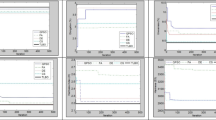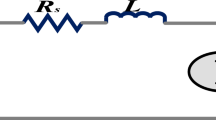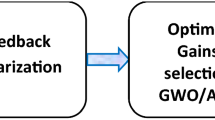Abstract
In advanced yarn production, the rotor spinning machine plays a significant role due to its low power consumption and high speed of yarn delivery. Nevertheless, if the speed of the machine exceeds from its desired level, the yarn output will go worsen. Therefore, in this paper, a novel optimal firefly algorithm based gain scheduling proportional-integral-derivative controller is proposed to regulate the speed of linear parameter varying based rotor spinning machine at the desired level. Here, the OFA is added to the GSPID controller for tuning the controller parameters. Consequently, Spline piecewise interpolation is newly developed to regulate the gain tuning parameters in high desired rate. The stability of the projected controller is synthesized by the combination of linear matrix variations with \(H_{\infty }\) control. Moreover, the error percentage and the accuracy of the proposed system are optimized using OFA. The implementation of this projected work was done in the MATLAB R2018b platform. Furthermore, the simulation result of the developed control strategy is compared with other traditional control approaches and its efficiency measure has proved by gaining less computational time as 10 s, error rate as 0.0982%, and high accuracy as 92%.

















Similar content being viewed by others
References
Ouda AN (2018) A robust adaptive control approach to missile autopilot design. Int J Dyn Control 6(3):1239–1271. https://doi.org/10.1007/s40435-017-0352-4
Ngabesong R, Yilmaz M (2019) Parametric and linear parameter varying modeling and optimization of uncertain crane systems. Int J Dyn Control 7(2):430–438. https://doi.org/10.1007/s40435-018-0466-3
Kiumarsi B, Vamvoudakis KG et al (2018) Optimal and autonomous control using reinforcement learning: a survey. IEEE Trans Neural Netw Learn Syst 29(6):2042–2062. https://doi.org/10.1109/TNNLS.2017.2773458
Fialho I, Balas GJ (2002) Road adaptive active suspension design using linear parameter-varying gain-scheduling. IEEE Trans Control Syst Technol 10(1):43–54. https://doi.org/10.1109/87.974337
Shen L, Yang X, Wang J, Xia J (2019) Passive gain-scheduling filtering for jumping linear parameter varying systems with fading channels based on the hidden Markov model. Proc Inst Mech Eng Pt I J Syst Control Eng 233(1):67–79. https://doi.org/10.1177/0959651818777679
Morato MM, Normey-Rico JE (2019) A linear parameter varying approach for robust dead-time compensation. IFAC-PapersOnLine 52(1):880–885. https://doi.org/10.1016/j.ifacol.2019.06.173
Zhang B, Xu S, Ma Q, Zhang Z (2019) Output-feedback stabilization of singular LPV systems subject to inexact scheduling parameters. Automatica 104:1–7. https://doi.org/10.1016/j.automatica.2019.02.054
Zhou B, Xie S, Hui J (2019) H-infinity control for TS aero-engine wireless networked system with scheduling. IEEE Access 7:115662–115672. https://doi.org/10.1109/ACCESS.2019.2935015
Apkarian P, Biannic JM, Gahinet P (1995) Self-scheduled H-infinity control of missile via linear matrix inequalities. J Guid Control Dyn 18(3):532–538. https://doi.org/10.2514/3.21419
Zong G, Wang R, Zheng W et al (2015) Finite-time H∞ control for discrete-time switched nonlinear systems with time delay. Int J Robust Nonlinear Control 25(6):914–936. https://doi.org/10.1002/rnc.3121
Cheng J, Park JH, Cao J, Zhang D (2018) Quantized H∞ filtering for switched linear parameter-varying systems with sojourn probabilities and unreliable communication channels. Inf Sci 466:289–302. https://doi.org/10.1016/j.ins.2018.07.048
Veselý V, Ilka A (2017) Generalized robust gain-scheduled PID controller design for affine LPV systems with polytopic uncertainty. Syst Control Lett 105:6–13. https://doi.org/10.1016/j.sysconle.2017.04.005
Casado-Vara R, Chamoso P, De la Prieta F, Prieto J (2019) Non-linear adaptive closed-loop control system for improved efficiency in IoT-blockchain management. Inf Fusion 49:227–239. https://doi.org/10.1016/j.inffus.2018.12.007
Panda A, Goswami S, Panda RC (2019) Dual estimation and combination of state and output feedback based robust adaptive NMBC control scheme on non-linear process. Int J Dyn Control 7(2):725–743. https://doi.org/10.1007/s40435-018-0474-3
Borase RP, Maghade DK, Sondkar SY, Pawar SN (2020) A review of PID control, tuning methods and applications. Int J Dyn Control. https://doi.org/10.1007/s40435-020-00665-4
Guo BZ, Wu ZH, Zhou HC (2015) Active disturbance rejection control approach to output-feedback stabilization of a class of uncertain nonlinear systems subject to stochastic disturbance. IEEE Trans Autom Control 61(6):1613–1618. https://doi.org/10.1109/TAC.2015.2471815
Zhusubaliyev ZT, Medvedev A, Silva MM (2015) Bifurcation analysis of PID-controlled neuromuscular blockade in closed-loop anesthesia. J Process Control 25:152–163. https://doi.org/10.1016/j.jprocont.2014.10.006
Toscano R, Lyonnet P (2009) Robust PID controller tuning based on the heuristic Kalman algorithm. Automatica 45(9):2099–2106. https://doi.org/10.1016/j.automatica.2009.05.007
us Saqib N, Rehan M, Iqbal N (2018) Static antiwindup design for nonlinear parameter varying systems with application to DC motor speed control under nonlinearities and load variations. IEEE Trans Control Syst Technol 26(3):1091–1098. https://doi.org/10.1109/TCST.2017.2692745
Weiss Y, Allerhand LI, Arogeti S (2018) Yaw stability control for a rear double-driven electric vehicle using LPV-(H∞) methods. Sci China Inform Sci. https://doi.org/10.1007/s11432-017-9339-7
Bektache A, Boukhezzar B (2018) Nonlinear predictive control of a DFIG-based wind turbine for power capture optimization. Int J Electr Power Energy Syst 101:92–102. https://doi.org/10.1016/j.ijepes.2018.03.012
Trudgen M, Velni JM (2018) Linear parameter-varying approach for modeling and control of rapid thermal processes. Int J Control Autom Syst 16(1):207–216. https://doi.org/10.1007/s12555-016-0788-x
Mahil SM, Boiko I (2018) Two-relay controller test approach to non-parametric PID tuning of a magnetic levitation system. In: 2018 15th international workshop on variable structure systems (VSS). IEEE. https://doi.org/10.1109/VSS.2018.8460247
Khoud KB, Bouallègue S, Ayadi M (2018) Design and co-simulation of a fuzzy gain-scheduled PID controller based on particle swarm optimization algorithms for a quad tilt wing unmanned aerial vehicle. Trans Inst Meas Control 40(14):3933–3952. https://doi.org/10.1177/0142331217740947
Yılmaz AR, Erol B, Delibaşı A, Erkmen B (2019) Design of gain-scheduling PID controllers for Z-source inverter using iterative reduction-based heuristic algorithms. Simul Model Pract Theory 94:162–176. https://doi.org/10.1016/j.simpat.2019.02.005
Pal D (2016) Modeling, analysis and design of a dc motor based on state space approach. Int J Eng Res Technol (IJERT) 5(2)
Kobaku T, Jeyasenthil R, Sahoo S et al (2020) Quantitative feedback design based robust PID control of voltage mode controlled DC–DC boost converter. IEEE Trans Circuits Syst II: Express Briefs. https://doi.org/10.1109/TCSII.2020.2988319
Author information
Authors and Affiliations
Corresponding author
Ethics declarations
Conflict of interest
The authors declare that they have no potential conflict of interest.
Ethical approval
All applicable institutional and/or national guidelines for the care and use of animals were followed.
Informed consent
For this type of study formal consent is not required.
Rights and permissions
About this article
Cite this article
Vilas, K.J., Asutkar, V.G. A novel optimal firefly algorithm based gain scheduling proportional integral derivative controller for rotor spinning machine speed control. Int. J. Dynam. Control 9, 1730–1745 (2021). https://doi.org/10.1007/s40435-021-00776-6
Received:
Revised:
Accepted:
Published:
Issue Date:
DOI: https://doi.org/10.1007/s40435-021-00776-6




